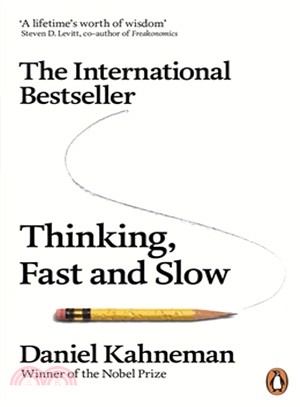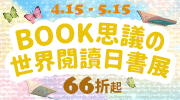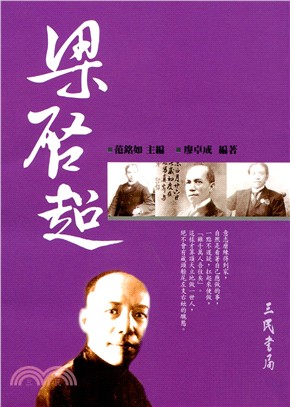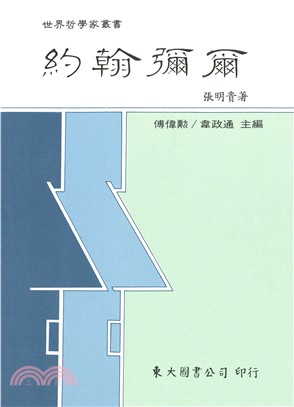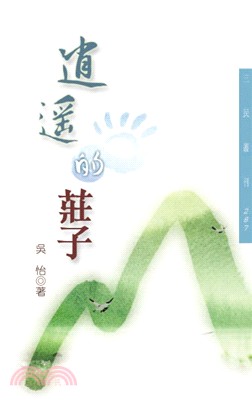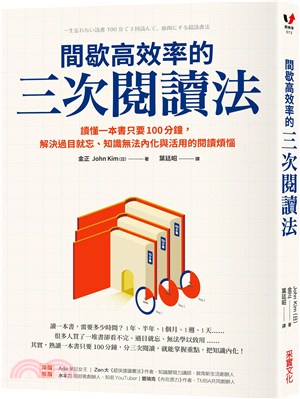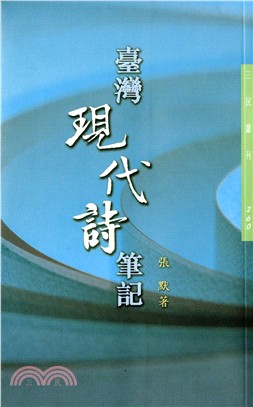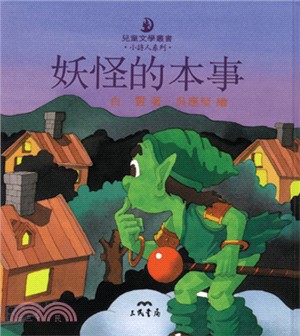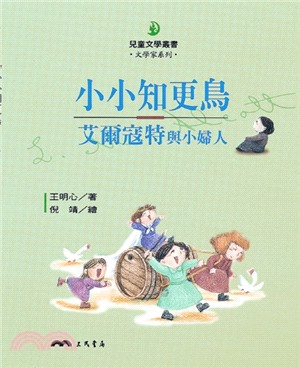Thinking, Fast and Slow
- ISBN13:9780141033570
- 替代書名:快思慢想
- 出版社:UK Penguin
- 作者:Daniel Kahneman
- 裝訂/頁數:平裝/512頁
- 規格:19.7cm*13cm (高/寬)
- 出版日:2012/07/02
商品簡介
全球重量級作者一致推薦!
如果一年只能讀一本書,你絕對不能錯過《快思慢想》!
慢慢讀,反覆讀,跟著他踏上美妙的心智探索之旅。
當代最偉大的心理學家、諾貝爾經濟學?得主──康納曼灌注五十餘年研究功力,
推出人類社會思想史上,第一本全面深度剖析大腦思考運作的「思考聖經」。
不僅可能改變你的思維方式,甚至改變你的工作、生活與人生。
Amazon、《紐約時報》、《華爾街日報》、《經濟學人》年度選書
認知科學權威洪蘭教授「六親不認、迫不及待想把它譯完,介紹給讀者看」、
中央研究院曾志朗院士專文推薦!
英文版上市一年,至今仍穩居Amazon認知心理類Top 1、
決策類Top 3、企業管理類Top 7、銷售總榜Top 100
《黑天鵝效應》作者塔雷伯大力推崇──《快思慢想》是人類社會思想史上的里程碑,媲美亞當斯密的《國富論》和佛洛依德的《夢的解析》。包括《蘋果橘子經濟學》、《為什麼你看不見大猩猩》、《推力》、《別讓科技統治你》、《大腦決策手冊》、《快樂為什麼不幸福》、《語言本能》
「快思」與「慢想」是我們腦中的兩位主角。它們大部分時候是朋友,有時是敵人,更常一起並肩打仗!
我們何時要相信直覺?何時要對抗直覺與偏見,召喚所有理性出來打仗?我們總以為能駕馭自己的思考,事實上,人們的行為常常受到未知因素所影響。我們對思考的機制充滿假設與誤解,又很依賴直覺的感知和記憶,常常做出因個人偏見導致的錯誤決策。
如果你希望自己更聰明、更冷靜,就要學會掌握「快思」與「慢想」的遊戲規則。
康納曼介紹了很多有趣的經典行為實驗,披露思考的捷徑、替代、偏好、框架、錨點等效應。不僅讓我們對大腦的複雜與非理性恍然大悟,也指出我們在什麼情況下該相信靈光乍現,什麼時候該三思而行,該運用哪些技巧來避免常常使我們陷入麻煩的思考偏誤,以及如何在商場、職場和個人生活中做出更好的選擇。
閱讀本書就像是一趟心智突破之旅,康納曼有如一位稱職的導遊,沿途為我們解說思考到底是怎麼一回事,系統1(直覺式思考)和系統2(邏輯式思考)這兩個主角在各種心理劇碼中如何搭配分工。
「這是快思的系統1,它很情緒化,依賴直覺,見多識廣又很會聯想,擅長編故事,系統1能迅速對眼前的情況做出反應。但它很容易上當,以為親眼所見就是事情的全貌,任由損失厭惡和樂觀偏見之類的錯覺引導我們做出錯誤的選擇。」
「這是慢想的系統二,它動作比較慢、擅長邏輯分析,系統1無力解決的問題,都丟給系統二處理。它雖然不易出錯卻很懶惰,經常走捷徑,直接採納系統1的判斷結果。」
康納曼重新詮釋了決策與判斷、風險、幸福和財富的關係,推翻了經濟學對人的決策是理性的假設,更首度披露「直覺偏見」和「邏輯捷徑」如何在不知不覺中,決定了我們自以為愜意的生活與社會樣貌,也將徹底改變你對思考的看法。
Selected by the New York Times Book Review as one of the best books of 2011
Daniel Kahneman, recipient of the Nobel Prize in Economic Sciences for his seminal work in psychology that challenged the rational model of judgment and decision making, is one of our most important thinkers. His ideas have had a profound and widely regarded impact on many fields—including economics, medicine, and politics—but until now, he has never brought together his many years of research and thinking in one book.
In the highly anticipated Thinking, Fast and Slow, Kahneman takes us on a groundbreaking tour of the mind and explains the two systems that drive the way we think. System 1 is fast, intuitive, and emotional; System 2 is slower, more deliberative, and more logical. Kahneman exposes the extraordinary capabilities—and also the faults and biases—of fast thinking, and reveals the pervasive influence of intuitive impressions on our thoughts and behavior. The impact of loss aversion and overconfidence on corporate strategies, the difficulties of predicting what will make us happy in the future, the challenges of properly framing risks at work and at home, the profound effect of cognitive biases on everything from playing the stock market to planning the next vacation—each of these can be understood only by knowing how the two systems work together to shape our judgments and decisions.
Engaging the reader in a lively conversation about how we think, Kahneman reveals where we can and cannot trust our intuitions and how we can tap into the benefits of slow thinking. He offers practical and enlightening insights into how choices are made in both our business and our personal lives—and how we can use different techniques to guard against the mental glitches that often get us into trouble. Thinking, Fast and Slow will transform the way you think about thinking.
Why is there more chance we'll believe something if it's in a bold type face?
Why are judges more likely to deny parole before lunch?
Why do we assume a good-looking person will be more competent?
The answer lies in the two ways we make choices: fast, intuitive thinking, and slow, rational thinking. This book reveals how our minds are tripped up by error and prejudice (even when we think we are being logical), and gives you practical techniques for slower, smarter thinking. It will enable to you make better decisions at work, at home, and in everything you do.
作者簡介
康納曼(Daniel Kahneman)
康納曼生於1934年,是繼佛洛依德之後,當代最偉大的心理學家。他在心理學上極具發展性的成就挑戰了判斷與決策的理性模式,他的跨領域研究對經濟學、醫學、政治、社會學、社會心理學、認知科學都有深遠的影響,也因他在行為經濟學領域的傑出貢獻,被譽為行為經濟學之父,更於2002年獲頒諾貝爾經濟學獎。
他在加州大學柏克萊分校取得心理學博士學位。現任普林斯頓大學心理學教授和伍德羅威爾森學院公共事務教授,並兼任希伯來大學理性研究中心研究員。《彭博市場》(Bloomberg Markets)雜誌評選康納曼為「年度全球金融界最具影響力的50人」之一。
書摘/試閱
REGRET
Regret is an emotion, and it is also a punishment that we administer to ourselves. The fear of regret is a factor in many of the decisions that people make (“Don’t do this, you will regret it” is a common warning), and the actual experience of regret is familiar. The emotional state has been well described by two Dutch psychologists, who noted that regret is “accompanied by feelings that one should have known better, by a sinking feeling, by thoughts about the mistake one has made and the opportunities lost, by a tendency to kick oneself and to correct one’s mistake, and by wanting to undo the event and to get a second chance.” Intense regret is what you experience when you can most easily imagine yourself doing something other than what you did.
Regret is one of the counterfactual emotions that are triggered by the availability of alternatives to reality. After every plane crash there are special stories about passengers who “should not” have been on the plane— they got a seat at the last moment, they were transferred from another airline, they were supposed to fl y a day earlier but had had to postpone. The common feature of these poignant stories is that they involve unusual events— and unusual events are easier than normal events to undo in imagination. Associative memory contains a representation of the normal world and its rules. An abnormal event attracts attention, and it also activates the idea of the event that would have been normal under the same circumstances. To appreciate the link of regret to normality, consider the following scenario:
Mr. Brown almost never picks up hitchhikers. Yesterday he gave a man a ride and was robbed.
Mr. Smith frequently picks up hitchhikers. Yesterday he gave a man a ride and was robbed.
Who of the two will experience greater regret over the episode?
The results are not surprising: 88% of respondents said Mr. Brown, 12% said Mr. Smith.
Regret is not the same as blame. Other participants were asked this question about the same incident:
Who will be criticized most severely by others?
The results: Mr. Brown 23%, Mr. Smith 77%. Regret and blame are both evoked by a comparison to a norm, but the relevant norms are different. The emotions experienced by Mr. Brown and Mr. Smith are dominated by what they usually do about hitchhikers.
EXAGGERATED EMOTIONAL COHERENCE (HALO EFFECT)
If you like the president’s politics, you probably like his voice and his appearance as well. The tendency to like (or dislike) everything about a person— including things you have not observed— is known as the halo effect. The term has been in use in psychology for a century, but it has not come into wide use in everyday language. This is a pity, because the halo effect is a good name for a common bias that plays a large role in shaping our view of people and situations. It is one of the ways the representation of the world that System 1 generates is simpler and more coherent than the real thing. You meet a woman named Joan at a party and find her personable and easy to talk to. Now her name comes up as someone who could be asked to contribute to a charity. What do you know about Joan’s generosity? The correct answer is that you know virtually nothing, because there is little reason to believe that people who are agreeable in social situations are also generous contributors to charities. But you like Joan and you will retrieve the feeling of liking her when you think of her. You also like generosity and generous people. By association, you are now predisposed to believe that Joan is generous. And now that you believe she is generous, you probably like Joan even better than you did earlier, because you have added generosity to her pleasant attributes.
Real evidence of generosity is missing in the story of Joan, and the gap is filled by a guess that fits one’s emotional response to her.
ANCHORING
Amos and I once rigged a wheel of fortune. It was marked from 0 to 100, but we had it built so that it would stop only at 10 or 65. We recruited students of the University of Oregon as participants in our experiment. One of us would stand in front of a small group, spin the wheel, and ask them to write down the number on which the wheel stopped, which of course was either 10 or 65. We then asked them two questions:
Is the percentage of African nations among UN members larger or smaller than the number you just wrote?
What is your best guess of the percentage of African nations in the UN?
The spin of a wheel of fortune— even one that is not rigged— cannot possibly yield useful information about anything, and the participants in our experiment should simply have ignored it. But they did not ignore it. The average estimates of those who saw 10 and 65 were 25% and 45%, respectively. The phenomenon we were studying is so common and so important in the everyday world that you should know its name: it is an anchoring effect. It occurs when people consider a particular value for an unknown quantity before estimating that quantity. What happens is one of the most reliable and robust results of experimental psychology: the estimates stay close to the number that people considered— hence the image of an anchor. If you are asked whether Gandhi was more than 114 years old when he died you will end up with a much higher estimate of his age at death than you would if the anchoring question referred to death at 35. If you consider how much you should pay for a house, you will be influenced by the asking price. The same house will appear more valuable if its listing price is high than if it is low, even if you are determined to resist the influence of this number; and so on— the list of anchoring effects is endless. Any number that you are asked to consider as a possible solution to an estimation problem will induce an anchoring effect.
THE ILLUSION OF STOCK- PICKING SKILL
In 1984, Amos and I and our friend Richard Thaler visited a Wall Street firm. Our host, a senior investment manager, had invited us to discuss the role of judgment biases in investing. I knew so little about finance that I did not even know what to ask him, but I remember one exchange. “When you sell a stock,” I asked, “who buys it?” He answered with a wave in the vague direction of the window, indicating that he expected the buyer to be someone else very much like him. That was odd: What made one person buy and the other sell? What did the sellers think they knew that the buyers did not?
Since then, my questions about the stock market have hardened into a larger puzzle: a major industry appears to be built largely on an illusion of skill. Billions of shares are traded every day, with many people buying each stock and others selling it to them. It is not unusual for more than 100 million shares of a single stock to change hands in one day. Most of the buyers and sellers know that they have the same information; they exchange the stocks primarily because they have different opinions. The buyers think the price is too low and likely to rise, while the sellers think the price is high and likely to drop. The puzzle is why buyers and sellers alike think that the current price is wrong. What makes them believe they know more about what the price should be than the market does? For most of them, that belief is an illusion.
In its broad outlines, the standard theory of how the stock market works is accepted by all the participants in the industry. Everybody in the investment business has read Burton Malkiel’s wonderful book A Random Walk Down Wall Street. Malkiel’s central idea is that a stock’s price incorporates all the available knowledge about the value of the company and the best predictions about the future of the stock. If some people believe that the price of a stock will be higher tomorrow, they will buy more of it today. This, in turn, will cause its price to rise. If all assets in a market are correctly priced, no one can expect either to gain or to lose by trading. Perfect prices leave no scope for cleverness, but they also protect fools from their own folly. We now know, however, that the theory is not quite right. Many individual investors lose consistently by trading, an achievement that a dartthrowing chimp could not match. The first demonstration of this startling conclusion was collected by Terry Odean, a finance professor at UC Berkeley who was once my student.
Odean began by studying the trading records of 10,000 brokerage accounts of individual investors spanning a seven- year period. He was able to analyze every transaction the investors executed through that firm, nearly 163,000 trades. This rich set of data allowed Odean to identify all instances in which an investor sold some of his holdings in one stock and soon afterward bought another stock. By these actions the investor revealed that he (most of the investors were men) had a definite idea about the future of the two stocks: he expected the stock that he chose to buy to do better than the stock he chose to sell.
To determine whether those ideas were well founded, Odean compared the returns of the stock the investor had sold and the stock he had bought in its place, over the course of one year after the transaction. The results were unequivocally bad. On average, the shares that individual traders sold did better than those they bought, by a very substantial margin: 3.2 percentage points per year, above and beyond the significant costs of executing the two trades.
It is important to remember that this is a statement about averages: some individuals did much better, others did much worse. However, it is clear that for the large majority of individual investors, taking a shower and doing nothing would have been a better policy than implementing the ideas that came to their minds. Later research by Odean and his colleague Brad Barber supported this conclusion. In a paper titled “Trading Is Hazardous to Your Wealth,” they showed that, on average, the most active traders had the poorest results, while the investors who traded the least earned the highest returns. In another paper, titled “Boys Will Be Boys,” they showed that men acted on their useless ideas significantly more oft en than women, and that as a result women achieved better investment results than men.
主題書展
更多主題書展
更多書展本週66折
您曾經瀏覽過的商品
購物須知
外文書商品之書封,為出版社提供之樣本。實際出貨商品,以出版社所提供之現有版本為主。部份書籍,因出版社供應狀況特殊,匯率將依實際狀況做調整。
無庫存之商品,在您完成訂單程序之後,將以空運的方式為你下單調貨。為了縮短等待的時間,建議您將外文書與其他商品分開下單,以獲得最快的取貨速度,平均調貨時間為1~2個月。
為了保護您的權益,「三民網路書店」提供會員七日商品鑑賞期(收到商品為起始日)。
若要辦理退貨,請在商品鑑賞期內寄回,且商品必須是全新狀態與完整包裝(商品、附件、發票、隨貨贈品等)否則恕不接受退貨。




